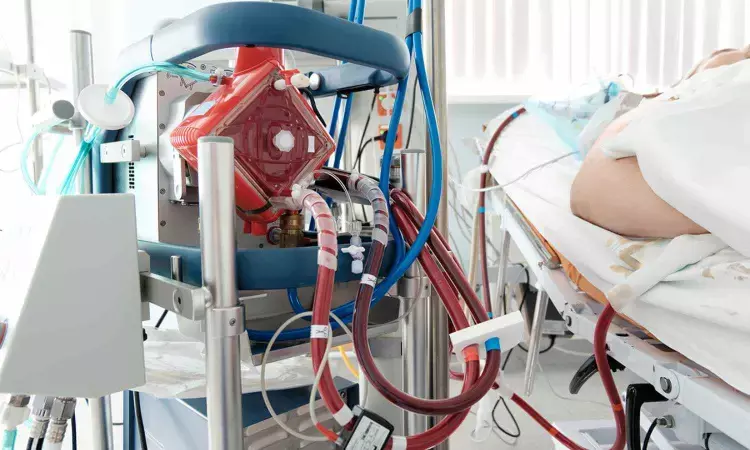- Home
- Medical news & Guidelines
- Anesthesiology
- Cardiology and CTVS
- Critical Care
- Dentistry
- Dermatology
- Diabetes and Endocrinology
- ENT
- Gastroenterology
- Medicine
- Nephrology
- Neurology
- Obstretics-Gynaecology
- Oncology
- Ophthalmology
- Orthopaedics
- Pediatrics-Neonatology
- Psychiatry
- Pulmonology
- Radiology
- Surgery
- Urology
- Laboratory Medicine
- Diet
- Nursing
- Paramedical
- Physiotherapy
- Health news
- Fact Check
- Bone Health Fact Check
- Brain Health Fact Check
- Cancer Related Fact Check
- Child Care Fact Check
- Dental and oral health fact check
- Diabetes and metabolic health fact check
- Diet and Nutrition Fact Check
- Eye and ENT Care Fact Check
- Fitness fact check
- Gut health fact check
- Heart health fact check
- Kidney health fact check
- Medical education fact check
- Men's health fact check
- Respiratory fact check
- Skin and hair care fact check
- Vaccine and Immunization fact check
- Women's health fact check
- AYUSH
- State News
- Andaman and Nicobar Islands
- Andhra Pradesh
- Arunachal Pradesh
- Assam
- Bihar
- Chandigarh
- Chattisgarh
- Dadra and Nagar Haveli
- Daman and Diu
- Delhi
- Goa
- Gujarat
- Haryana
- Himachal Pradesh
- Jammu & Kashmir
- Jharkhand
- Karnataka
- Kerala
- Ladakh
- Lakshadweep
- Madhya Pradesh
- Maharashtra
- Manipur
- Meghalaya
- Mizoram
- Nagaland
- Odisha
- Puducherry
- Punjab
- Rajasthan
- Sikkim
- Tamil Nadu
- Telangana
- Tripura
- Uttar Pradesh
- Uttrakhand
- West Bengal
- Medical Education
- Industry
Association of activated clotting time with hemorrhagic or thromboembolic events controversial and limited, suggests research

Bleeding vs. Non-Bleeding ACT Studies
The review identified 8 studies reporting on ACT values in patients with and without bleeding, and 3 studies reporting on ACT values in patients with and without thrombosis. The meta-analysis of the 8 studies found no significant difference in mean ACT values between patients with and without bleeding (SMD = 0.69, 95% CI -0.05 to 1.43, p=0.069). However, there was high heterogeneity among the studies (I2=87.4%). After excluding one study that significantly contributed to the heterogeneity, the repeated meta-analysis still did not find a significant difference in ACT values between the groups (SMD = 0.40, 95% CI -0.01 to 0.82, p=0.058).
Thrombosis vs. Non-Thrombosis ACT Studies
The meta-analysis of the 3 studies reporting on thrombosis also did not find a significant difference in mean ACT values between patients with and without thrombotic events (SMD = 0.47, 95% CI -0.50 to 1.44, p=0.342), although there was high heterogeneity (I2=81.1%).
Use of ACT in ECMO
The review highlights that despite the widespread use of ACT for anticoagulation monitoring during ECMO, the evidence on its association with hemorrhagic or thromboembolic complications remains limited and controversial. Factors such as the timing of ACT measurements, as well as the intrinsic limitations of ACT (e.g. influence by hypothermia, platelet count/function, coagulation factors), may contribute to the inconsistent findings across studies. The authors conclude that further research is essential to elucidate the role of ACT in anticoagulation monitoring for ECMO patients. Prospective or randomized studies with standardized measurement protocols are needed to better understand the relationship between ACT and adverse events during ECMO support. Additionally, the development and evaluation of alternative anticoagulation monitoring strategies, such as anti-factor Xa and viscoelastic testing, may help clarify the most appropriate approach for this patient population.
Key Points
1. The systematic review and meta-analysis examined the association between activated clotting time (ACT)-guided anticoagulation monitoring and the occurrence of hemorrhagic or thromboembolic complications in patients receiving extracorporeal membrane oxygenation (ECMO) support.
2. The meta-analysis of 8 studies found no significant difference in mean ACT values between patients with and without bleeding, although there was high heterogeneity among the studies. After excluding one study, the repeated meta-analysis still did not find a significant difference in ACT values between the groups.
3. The meta-analysis of 3 studies reporting on thrombosis also did not find a significant difference in mean ACT values between patients with and without thrombotic events, although there was high heterogeneity.
4. The review highlights that despite the widespread use of ACT for anticoagulation monitoring during ECMO, the evidence on its association with hemorrhagic or thromboembolic complications remains limited and controversial.
5. Factors such as the timing of ACT measurements, as well as the intrinsic limitations of ACT (e.g. influence by hypothermia, platelet count/function, coagulation factors), may contribute to the inconsistent findings across studies.
6. The authors conclude that further research is essential to elucidate the role of ACT in anticoagulation monitoring for ECMO patients, and that prospective or randomized studies with standardized measurement protocols are needed. Additionally, the development and evaluation of alternative anticoagulation monitoring strategies, such as anti-factor Xa and viscoelastic testing, may help clarify the most appropriate approach for this patient population.
Reference –
Daniel Schwaiger et al. (2024). Association Of Activated Clotting Time-Guided Anticoagulation With Complications During Extracorporeal Membrane Oxygenation Support: A Systematic Review And Meta-Analysis.. *Journal Of Cardiothoracic And Vascular Anesthesia*. https://doi.org/10.1053/j.jvca.2024.09.003
MBBS, MD (Anaesthesiology), FNB (Cardiac Anaesthesiology)
Dr Monish Raut is a practicing Cardiac Anesthesiologist. He completed his MBBS at Government Medical College, Nagpur, and pursued his MD in Anesthesiology at BJ Medical College, Pune. Further specializing in Cardiac Anesthesiology, Dr Raut earned his FNB in Cardiac Anesthesiology from Sir Ganga Ram Hospital, Delhi.
Dr Kamal Kant Kohli-MBBS, DTCD- a chest specialist with more than 30 years of practice and a flair for writing clinical articles, Dr Kamal Kant Kohli joined Medical Dialogues as a Chief Editor of Medical News. Besides writing articles, as an editor, he proofreads and verifies all the medical content published on Medical Dialogues including those coming from journals, studies,medical conferences,guidelines etc. Email: drkohli@medicaldialogues.in. Contact no. 011-43720751


